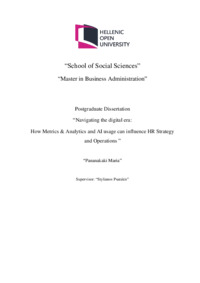- MSc thesis
- Διοίκηση Επιχειρήσεων (MBA)
- 13 Σεπτεμβρίου 2025
- Αγγλικά
- 82
- Stelios Psarakis
- Human Resources Management | Artificial Intelligence (AI) | Metrics | Analytics
- Master in Business Administration / MBA 61
- 81
-
-
This study gives a broad outline of the changing role of artificial intelligence
(AI) in human resource management (HRM) within the digital era. It starts with the
strategic importance of HRM, marking the change from the traditional management of
labor cost to an asset of prime value within an organization for talent procurement,
development, and retention. HR functions face new opportunities and challenges due
to the impact of the digital revolution, which involves fast-pacing technology
adoptions like the internet, blockchain, and quantum computing. AI forms part of
Industry 4.0 and is integrated into the various processes of HR whereby employee
relations, training, hiring, and appraisals are some of the most affected areas. The
benefits of AI in operational and analytical tasks have been embraced with optimism
by employees. On the contrary, there is a reservation toward the benefits concerning
the human-centered functions and the ethical aspects in which a lot of considerations
have not been exhaustively explored. Demographic awareness shows different levels
of exposure. More familiar and receptive groups tend to be the younger and more
educated employees.
The study shows that there is mixed organizational readiness for AI adoption.
Infrastructure and leadership support are notable, with job displacement being another
worry. Transparency and fairness, in terms of being seen to be doing the right thing,
should have prominent issues with clear guidelines and responsible AI practices.
Findings impel HR professionals to create an ethical framework, to continue
developing digital skills, and to keep the implementation of technology human-
centered. Practical recommendations call for the establishment of national guidelines
regarding proper AI ethics, for educating HR staff, for measuring metrics that tie to
strategic goals, and for transparency in AI decision-making. Further research
directions call for qualitative studies, analysis by industry type, assessment of the
impact of AI on diversity, and longitudinal studies to monitor the impact of AI in
HRM.
On the whole, the use of AI in HRM is very likely to enhance organizational
performance and employee experience in those fits and starts where the ethical,
strategic, and human dimensions are duly considered.
-
- Hellenic Open University
- Attribution-NonCommercial-NoDerivatives 4.0 Διεθνές
Navigating the digital era: How Metrics & Analytics and AI usage can influence HR Strategy and Operations
Κύρια Αρχεία Διατριβής
 Κύριο μέρος της Διπλωματικής
Κύριο μέρος της Διπλωματικής
Περιγραφή: Pananakaki-Maria-Dissertation-MBA.pdf (pdf) Book Reader
Μέγεθος: 1.0 MB

